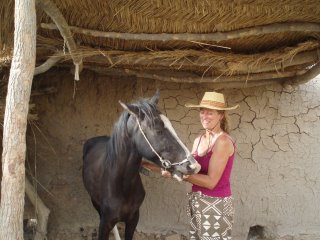
And then there is the business about sleeping out on the roof.
It is getting hot here now, and I want to move out onto the roof and sleep under the stars . But it is not yet allowed, because it has to be announced at the mosque. ' What on earth have they got to do with people's sleeping habits?' I ask, with some irritation. And I am told that if one attempts to sleep out before the ritual benedictions have taken place it is not safe and one is likely to encounter bad spirits.
(Let me digress for a moment concerning the bad spirits of Djenne, which come in the shape of dwarfs apparently, and have their feet turned the wrong direction pointing backwards. They seem to resemble leprichorns, but they are more dangerous and mustn't be trifled with, because they carry lethal arrows. During the day they seem hilarious and rather endearing to me, especially when I am told that they really like guavas and often hide in the shade of guava trees. I have a vision of a sort of jolly English garden gnome. But when I am alone at night and the generator is turned off I don't like the idea much and wouldn't like to meet one lurking in my bathroom for instance, so just to be on the safe side I recite the 91st psalm:
He who dwells in the shelter of the Most High
will rest in the shadow of the Almighty.
I will say of the Lord 'He is my
refuge and my fortress, my God, in whom I trust'.
Surely he will save you from the
fowler's snare
and from the deadly pestilence.
He will cover you with his feathers,
and under his wings you will find refuge;
his faithfulness will be your shield and rampart .
You will not fear the terror of night,
nor the arrow that flies by day,
nor the pestilence that stalks in the darkness,
nor the plague that destroys at midday....
A thousand may fall at your side,
ten thosand at your right hand,
but it will not come near you...
then I fall asleep, peacefully.
Djenne has always been troubled by such phenomena , it seems. At the foundation of the town of Djenne bad spirits were causing the buildings to collapse. According to oral tradition a young Bozo girl named Pama Kayamtao had to be sacrificed in order for the town to be built. Her tomb, the tomb of Tapama, (our mother Pama) is still visited as one of the tourist attractions of Djenne.)
So do people really believe in these sort of things? I don't know, but I do know that Malians believe in tradition in a much more serious way than we do in the West. While we are likely to ask why , Malians are likely to accept things as they are. ‘In Mali we do things like this, or like that’, as if there is no individual freedom of choice at all. Individualism is of course something relatively recent in the West too, epitomised in the American ethos, so obsessed with individual freedom. That freedom of individual expression, so precious to an American does not really mean all that much to an African, if I am not mistaken, and therefore democracy, the great defender of this perceived human right to say, think and do whatever we like within the limits of the law is often not really seen as that important.

 This magnificent lady is Baji, my potter, who made the sinks in the bathrooms and the 'ostrich eggs' that goes on top of the four poster beds. She is here wearing a locally made traditional bogolan outfit, woven and painted in Djenné. In my opinion this outfit could grace the catwalk of John Galliano, i.e. the best the West has to offer as far as fashion goes. It is my intention that eventually, perhaps even next season, we will have little fashion shows at Hotel Djenné Djenno, with pieces like these and some of the things we make ourselves.
This magnificent lady is Baji, my potter, who made the sinks in the bathrooms and the 'ostrich eggs' that goes on top of the four poster beds. She is here wearing a locally made traditional bogolan outfit, woven and painted in Djenné. In my opinion this outfit could grace the catwalk of John Galliano, i.e. the best the West has to offer as far as fashion goes. It is my intention that eventually, perhaps even next season, we will have little fashion shows at Hotel Djenné Djenno, with pieces like these and some of the things we make ourselves.

























